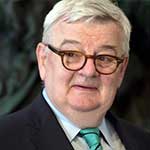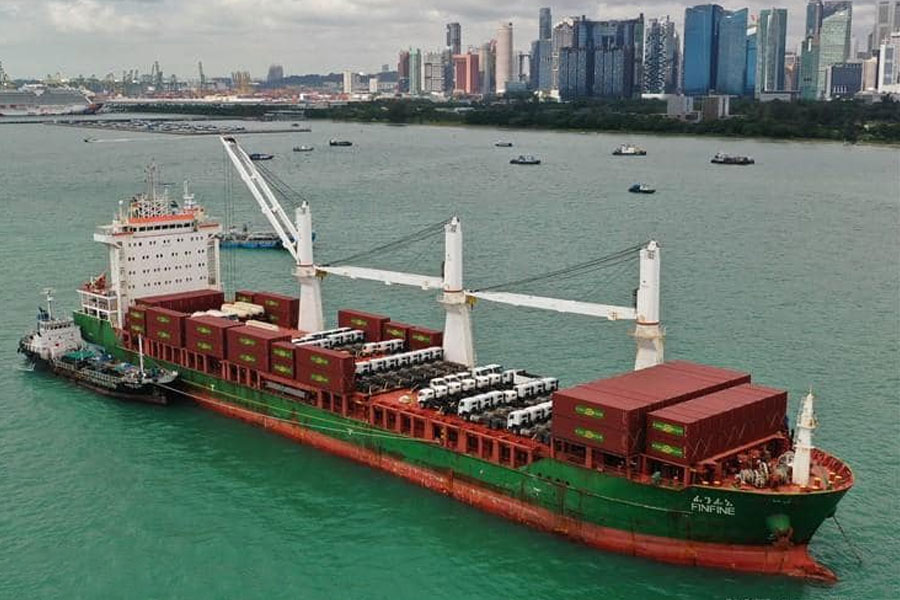
Viewpoints | Oct 28,2023
May 31 , 2020
By Joschka Fischer
Although the Sino-American rivalry was escalating long before the COVID-19 crisis erupted, it has since been thrown into overdrive. But while both countries are pursuing a zero-sum vision of the future, only one is doing so with a long-term strategy, writes Joschka Fischer, Germany's former foreign minister and vice-chancellor.
The COVID-19 pandemic is arguably the first truly global crisis of the 21st century. The only modern historic parallel to the economic disruption triggered by this microscopic pathogen are the world wars of the last century.
The start of World War I in August 1914 not only ended a long period of peace but also suspended an earlier epoch of economic integration and globalisation. As governments around the world pursued new protectionist agendas, economic growth collapsed across the board. A generation later, another world war followed, after which the Cold War began immediately.
The world, and global politics, looked very different at the end of this period of constant conflict and power politics - from 1914 until 1989 - than it did at the beginning. Prior to World War I, the British Empire was the dominant economic and military power. After World War II, it was supplanted by the United States, whose hegemonic position was further strengthened following the collapse of the Soviet Union.
The question, then, is how the distribution of global power will change as a result of the COVID-19 crisis. Whether the pandemic’s impact will be comparable to that of either world war remains to be seen. Clearly, a global economic crisis on this scale will bring serious geopolitical shocks. America, the incumbent superpower, may well cling to its position at the top of the global pecking order. But most signs suggest that China, the emerging superpower, will prevail, inaugurating an East Asian century.
The Sino-American rivalry was shaping up to be the 21st century’s defining hegemonic conflict long before the COVID-19 crisis. Nonetheless, the pandemic, along with election year politics in the US, seems to be amplifying and accelerating the confrontation. For US President Donald Trump, everything is at stake in November’s election. Having mismanaged the pandemic and presided over an unprecedented domestic economic crisis, he needs a scapegoat, and China is the obvious choice.
After all, while most of Trump’s policies have, as a general rule, divided American society, his approach to China is a major exception. In going on the offensive against China, he can count on broad bipartisan support. Even deep into liberal Democratic Party ranks, American attitudes toward China have soured substantially in recent years.
Many US objections are hard to dismiss. The People’s Republic is indeed an authoritarian – even totalitarian – state under the exclusive control of a Leninist party. It has engaged in economic and technological espionage against the US on a grand scale, resorted to unfair trade practices, and violently asserted territorial claims vis-à-vis India, Taiwan, and in the South China Sea. From its persecution of ethnic and religious minorities in Xinjiang and its recent move to consolidate control over Hong Kong to its initial mishandling of the COVID-19 outbreak in Wuhan, China’s government has done little to inspire trust.
Nonetheless, the Trump administration's persistent efforts to repudiate America’s global leadership role raises a fundamental question about its approach: what does the US under Trump want? To lead without taking responsibility?
That is unlikely to work. While the US remains mired in short-term thinking, China is establishing itself as an alternative source of global leadership and investment, patiently pursuing a long-term strategy to exploit the geopolitical vacuum created by America’s inward turn.
In any case, the blow to America’s international image, especially following the Trump administration’s disastrous failure in the face of COVID-19, will be hard to repair. The pandemic is reinforcing the general impression that the US is a decadent superpower, soon to be supplanted by a strategically deft and economically dynamic China. The age-old story of the rise and fall of great powers is now being written by a virus. We can only hope that this chapter plays out peacefully.
Against the backdrop of the Sino-American confrontation, Europe finds itself caught uncomfortably between two opposing geopolitical forces – and left in the dark about America’s true intentions toward China.
Does the US want to pursue containment or all-out confrontation – up to and including military conflict – to block or even reverse China’s ascent?
The second strategy, reprising the West’s approach to China during the late 19th century, would be extremely dangerous, to say the least.
The alternative for the West is to pursue long-term containment on the basis of strategic rivalry. Europe would be well-advised to choose this option. In a Chinese-led world order, Europe, situated at the western end of the Eurasian supercontinent, would be the loser. As a totalitarian one-party state, China can never be a genuine partner to Europe in normative terms. Even after three years of Trump, Europe’s relationship with the US remains much closer than the relationship it could ever expect with China.
But China is already too big, too successful, and too important to ignore. The facts on the ground call for cooperation. The key is to distinguish between strategic engagement with China and submission to it. And maintaining that crucial distinction will require Europe to avoid becoming economically or technologically dependent on the West’s rival.
PUBLISHED ON
May 31,2020 [ VOL
21 , NO
1049]


Viewpoints | Oct 28,2023

Fortune News | Dec 01,2024

Viewpoints | Aug 25,2024

Viewpoints | Jan 09,2021


Radar | Jun 30,2024

Radar | Aug 16,2020

Viewpoints | Apr 25,2020

Radar | Oct 15,2022

Viewpoints | Jun 18,2022

Photo Gallery | 180335 Views | May 06,2019

Photo Gallery | 170532 Views | Apr 26,2019

Photo Gallery | 161565 Views | Oct 06,2021

My Opinion | 137274 Views | Aug 14,2021

Dec 22 , 2024 . By TIZITA SHEWAFERAW
Charged with transforming colossal state-owned enterprises into modern and competitiv...

Aug 18 , 2024 . By AKSAH ITALO
Although predictable Yonas Zerihun's job in the ride-hailing service is not immune to...

Jul 28 , 2024 . By TIZITA SHEWAFERAW
Unhabitual, perhaps too many, Samuel Gebreyohannes, 38, used to occasionally enjoy a couple of beers at breakfast. However, he recently swit...

Jul 13 , 2024 . By AKSAH ITALO
Investors who rely on tractors, trucks, and field vehicles for commuting, transporting commodities, and f...

Nov 1 , 2025
The National Bank of Ethiopia (NBE) issued a statement two weeks ago that appeared to...

Oct 25 , 2025
The regulatory machinery is on overdrive. In only two years, no fewer than 35 new pro...

Oct 18 , 2025
The political establishment, notably the ruling party and its top brass, has become p...

Oct 11 , 2025
Ladislas Farago, a roving Associated Press (AP) correspondent, arrived in Ethiopia in...

Nov 2 , 2025
The National Bank of Ethiopia (NBE) has scrapped the credit-growth ceiling that had s...

Nov 2 , 2025 . By SURAFEL MULUGETA
The burgeoning data mining industry is struggling with mounting concerns following th...

Nov 2 , 2025 . By YITBAREK GETACHEW
Berhan Bank has chosen a different route in its pursuit of a new headquarters, opting for a transitional building instea...

Nov 2 , 2025 . By BEZAWIT HULUAGER
Nib International Bank S.C. has found itself at the epicentre of a severe governance...